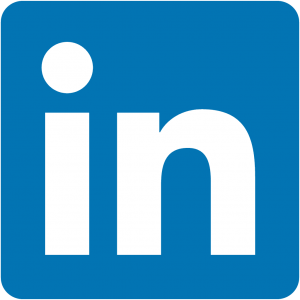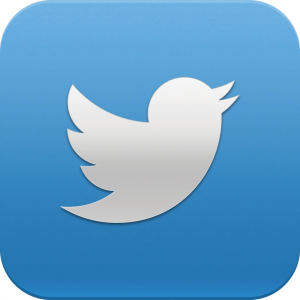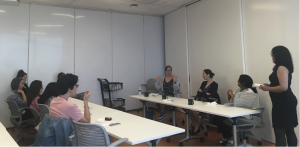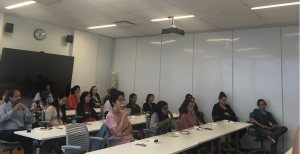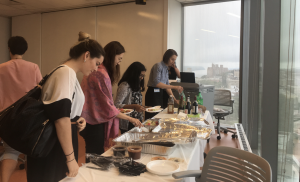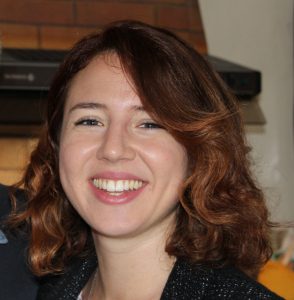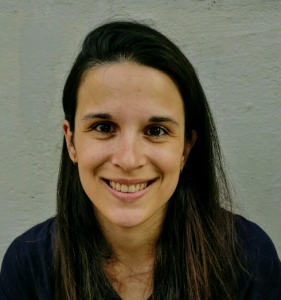
Meet Our Postdocs: Marie Labouesse, Postdoctoral Research Fellow at the Department of Psychiatry at Columbia University.
Which department are you in at Columbia and what is your position?
I am a Postdoctoral Research Fellow in the Department of Psychiatry.
Where are you from and how long have you been in NYC?
I’m from France and moved to NYC in October 2016.
Where did you go to school? Describe your path to your current position.
I did my undergrad and MSc. in Paris where I studied Biology and Nutritional Sciences at AgroParisTech. It was more of an applied school and I realized kind of late that actually I wanted to do research. I had recently attended a Neuroscience class and I got hooked immediately. I decided to go back to school one last year to get an accelerated MSc. in Neuroscience (at UPMC in Paris). The first month was tough: unlike my fellow classmates, neuroscience was completely new to me and the lectures were quite challenging. I thought I would not manage to get through all my exams. But with a lot of studying, I actually managed, and in the end I liked it so much that I decided to continue with a PhD in Neuroscience. I was too late for applying to all the PhD programs in France, but I managed to get into a really nice spot at ETH Zurich in Switzerland. All this to say it’s OK to switch topics throughout your studies, and you’ll end up landing on your feet!
During my PhD I studied how the early environment, e.g. stress or diets, can affect brain maturation during early postnatal development. I really liked the concepts of “critical periods of development”, it was fascinating. But it was challenging to ask questions in a very mechanistic way because the early environment affects brain development in so many parallel ways. So then, I decided to switch gears a bit and do a postdoc in a rather new field known as “circuit neuroscience”. In this field, researchers target specific neuronal populations with genetic tools and ask what their roles are in regulating behavior in an acute manner. Doing this, they map new “brain circuits” that are important for controlling behaviors such as movement, anxiety, social interactions, motivation, etc.
I stayed in my PhD lab for 9-10 months, to wrap up projects and to apply to postdoc labs and fellowships. I got pretty lucky and ended up having to choose between two fellowships, either at UC Berkeley in San Francisco or in NYC – a luxury problem (I always wanted to live in both of these cities). I chose NYC because my mentor sounded like a great person who really challenged you scientifically but also gave you intellectual freedom on your projects. Here I am at Columbia University since October 2016.
What research question are you trying to figure out right now?
Right now, I am trying to understand how the brain controls how we move. The idea is to find out new types of neurons that regulate motor function, and this may help one day to better understand what goes wrong in brain disorders such as Parkinson’s disease. More specifically, I focus on a brain region called the striatum, which has a particular cell type known as D1 neurons. We already know that D1 neurons are very important for regulating motor function, but we still don’t know what are the specific mechanisms. D1 neurons send axonal projections outside the striatum to other brain regions and what I’m trying to understand is what are the effects of activating D1 neurons on the activity of downstream brain regions. I also try to understand what are the mechanisms at the synaptic level that can explain how D1 neurons control movement. I wrote a short Science story about this recently.
In a nutshell, what tools or approaches are you using to try and figure this out?
One of the main tools I use to monitor D1 neurons is called “in vivo calcium imaging”. This method allows to track neural activity of D1 neurons in vivo. I do this in mouse models while mice perform behavioral motor tasks. This allows me to understand what are the brain signatures of D1 neurons during movement. I also use “chemogenetics” and “optogenetics” which allow me to activate or inhibit D1 neurons cell-specifically during motor tasks and find out their causal role in behavior, or in regulating downstream activity in the brain.
These different tools are part of the “circuit neuroscience” palette, and have been developed quite recently (in the past 5-15 years) by a bunch of super innovative engineers, chemists, physicists and biologists. It has really been an incredible cross-disciplinary effort that has transformed the way people study the brain between the early 2000s and now.
Why do you love science?
I love the logic of it. In this new field I joined, I can really manipulate particular neuron populations in the brain and see what exactly their role is in controlling behavior. It’s very rewarding.
What advice would you give to people interested in a career in science?
First, go for something you are fascinated about. It’s the fascination that will keep you motivated, especially if you do a PhD and need to stay excited about your research topic for 3-5 years. Second, if possible, get lab experience as early as possible, that’ll help you pick up technical skills faster in any future lab you will work in. But it’s also OK if you didn’t; I started pretty late, it was tough at the beginning but I learned on the go. Also, learn how to code! That’ll help you in any research topic. Third, if you want to change topics for your postdoc, do it! It might feel hard at first, but you’ll come in into this new field with a new angle as compared to your colleagues and the synergies might be super useful!
Also, keep asking yourself on a regular basis whether you want to stay in academia, or if it’s your PI, your parents or “you-5-years-ago” who wants/wanted that. Life in academia is very fulfilling but can also be in certain cases stressful or just very time-consuming. There are so many other jobs out there that are equally cool and challenging and in which you can be very successful and happy. If you’re curious about these other careers, don’t only talk to your PI, talk to other people outside of lab, go to career panels, join your postdoc association (e.g. CUPS), etc.
Finally, when you interview in a lab for a position, try to meet the lab members, ask what their mentor is like, what the lab vibe is. I always focused on working in labs with a good vibe, where mentoring grad and undergrad students and sharing resources are valued, and it has always paid off. I hope to continue transmitting this approach when/if I open my lab one day!
Tell us a bit about yourself or your projects that are not related to science.
My favorite thing to do outside of lab is to play basketball. I play at leagues like Zogsports or NY Urban where you can sign up as an individual even if you don’t have a team (I highly recommend it). I also like to go hiking in the mountains or do outdoor activities.
What is your favorite thing about NYC?
The food for sure! Also the fact that I felt at home really quickly, people are very welcoming and make you feel like you belong to NYC.
When did you join CUPS and what is your current role, if any?
I joined CUPS in June 2018. First, I was part of the Research & Professional Development Committee. One event I was very happy about was a Career Panel where we invited 4 former Columbia Postdocs who had transitioned to Scientist Positions in Industry (eg Pfizer, Novartis). We had a really nice crowd and the panelists answered a lot of important questions for all those wondering about industry scientist positions.
I then got interested in graphic communications & outreach and therefore founded the Outreach & Communications Committee in Jan 2019 together with Sandra Franco Iborra. We were just 2 to start off with and now have a stable group of 6-8 people, all super motivated and creative. That’s really cool to see. I got this Science Postdoc Blog set up and going, and I am now passing it over to new members. I also helped on some really nice outreach events, such as a recent Science Trivia Night the group organized.
What do you like the most about CUPS?
Meeting so many cool people that I would not have had the chance to meet otherwise. It’s a really nice way to make friends when you arrive here and don’t know anyone. I also like to discover how people do science in different disciplines that I don’t know much about. I would not have met climate scientists or mathematicians or space scientists otherwise! The Meet our Postdocs blog section has also been a great resource in this respect.
To follow Marie:
